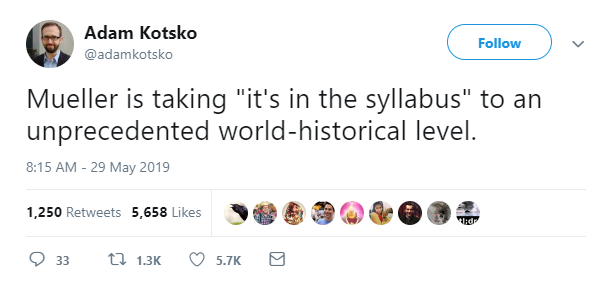- Facebook329
- Twitter1
- Total 330
Buzzfeed’s Tanya Chen assembles lots of tweets and other quotes that analogize Bob Mueller to a frustrated college instructor. The American people are his students. Since we didn’t do the reading, we want him to explain it all in simple terms.

These are amusing responses, but they raise the question of what millions of Americans are really obligated to read. I once heard a Supreme Court justice say (to the approbation of the audience in the room) that citizens shouldn’t criticize judicial decisions unless they have read them, presumably in full. Some environmentalists despair that most people didn’t read the last big Intergovernmental Panel on Climate Change (IPCC) report for themselves. It seems outrageous that the President of the United States, who swore to uphold the Constitution, would fail a basic test of its contents. (For instance, he expects the judiciary to review an impeachment process.)
But once you put several of these assignments together, it makes for a daunting syllabus.
And it depends on what else you would do with your time. Instead of reading the Mueller Report, I have actually spent hours neurotically checking second-hand opinions about the report in order to root for the ones that say that Trump is in big trouble and boo the ones that say he’s been exonerated. That was a bad decision about how to allocate my attention. If I’d spent the same hours reading the report, I might have learned something. However, the text of the report would not change my opinions and behavior in a way that would matter for the country. So it would have been wiser still for me to spend my time not on the Mueller Report, nor on the endless second-hand commentary, but rather (for example) on the work of the astoundingly creative Anne Carson.
I start with faith that certain responsible summaries of the Mueller Report will give me what I need to know. I then waste time reading all the other commentary in the light of what I already believe. If I took Sean Hannity to be the responsible commentator instead of Lawfare or the New York Times, my behavior would be exactly the same but my conclusions would be the opposite. The problem is deciding who is the responsible intermediary, and you can’t do that with 100% certainty unless you read the original text for yourself. But again, it is not obvious that we are morally obliged to understand the Mueller Report with 100% certainty, when there are other things to do with our day.
The Great Professor in the Sky definitely expects us to do the reading. But I am not sure we are all obliged to take Professor Mueller’s class. We do face a mandatory exam called the 2020 election, but it will cover a whole lot of material, and you can do fine on it even if you didn’t take Mueller.
Your responsibility as a citizen–as distinct from your duty as a person–obliges you to collect information and insights about public affairs. (Your duty as a person is to read Anne Carson.) But there is an awful lot to learn about public affairs, of which the Mueller Report is only one sample. What bothers me is the implication that everyone should have mastered that particular body of material, when no one can understand everything that matters.